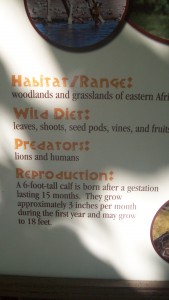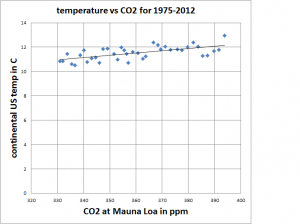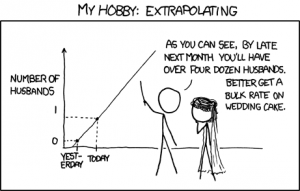Jul 27
Here is a problem I have used in my algebra class. It uses knowledge of lines, functions, and extrapolation versus interpolation. (I find that in order for the students to be able to read the picture of the sign, I have to print it in color. Next time I go to the zoo I am going to try to get a better picture.)
The sign shown below from the Detroit Zoo gives various information about giraffes. Use the information from the sign to answer the following questions.

A) Write a function g(t) describing the height of a giraffe during its first year of life where t is the age of the giraffe in months.
B) How tall is a giraffe when it is one year old? Give your answer in a complete sentence with units.
C) Compute g(-1). Is this interpolation, reasonable extrapolation, or reckless extrapolation?
Jul 07
This is a problem I work through in my pre-calculus class when we are discussing the meaning of the slope and y-intercept. It also gives me the opportunity to discuss the perils of extrapolating far outside of the data set.
Consider the following data and the linear model that fits it.

The equation for the linear model is y=0.019x+4.76. Answer the following questions in complete sentences with units.
- What are the units for the slope?
- What does the slope mean in this particular situation?
- What are the units for the y-intercept?
- What does the y-intercept mean in this particular situation?
(data from http://www.esrl.noaa.gov/gmd/dv/data/index.php?site=mlo¶meter_name=Carbon%2BDioxide&frequency=Monthly%2BAverages and http://www.ncdc.noaa.gov/cag/ )
Jan 06
Here are a few comic strips dealing with extrapolation. Each is accompanied by a question I would ask students about the strip.
1) Explain this comic strip using knowledge from the course.

(This strip is by Randall Munroe and can be accessed at http://xkcd.com/605/)
2) Read this comic strip by Randal Munroe and answer the following questions.

(This strip can be accessed at http://xkcd.com/1007/)
a) For which span of years does the Munroe have data on the frequency of the use of the word “sustainable”?
b) Munroe made a model of this data. Does the model fit the data well?
c) Munroe used his model to predict the frequency of the word “sustainable” in 2061. What percent of words does he predict will be ”sustainable” in 2061? Is this an example of interpolation or extrapolation? Is this prediction likely to be valid?



